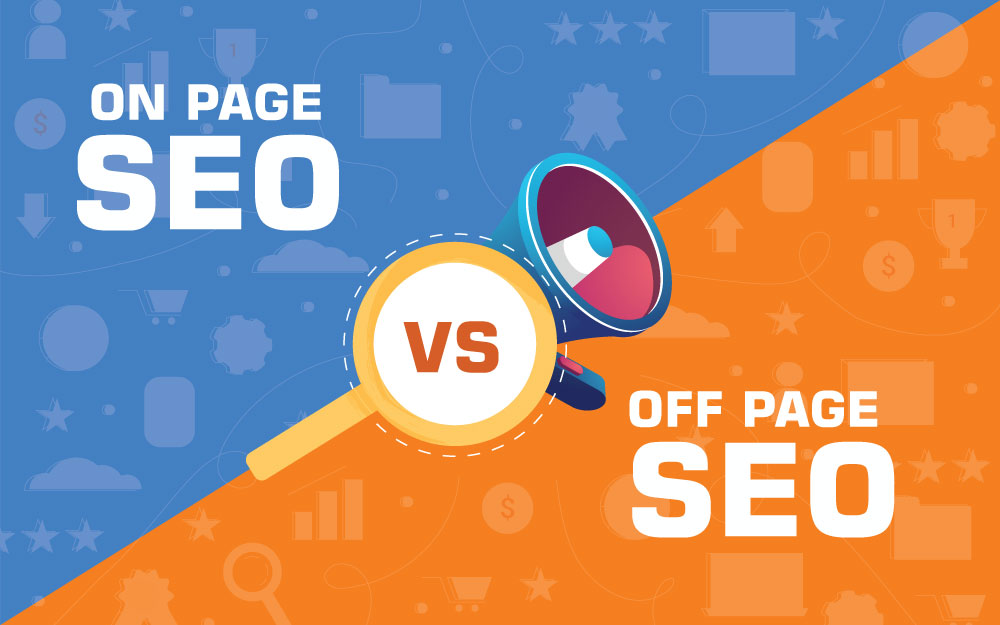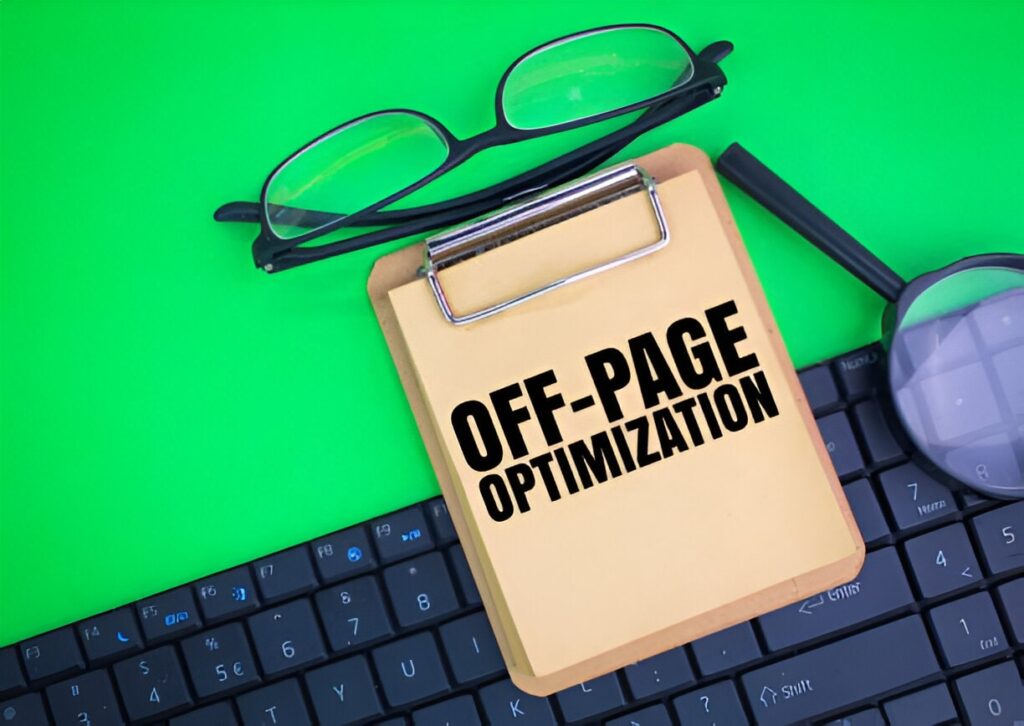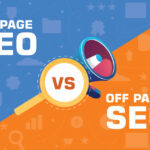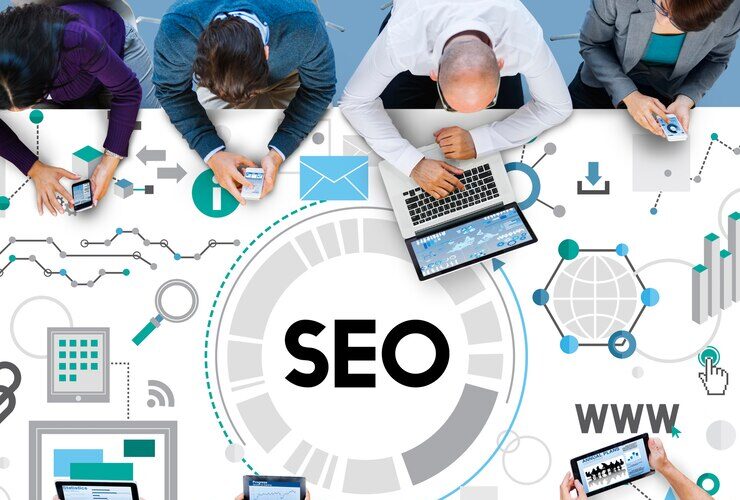
Knowing how to optimize your website is key to its success. Optimizing your online presence means two main things: making your website better and building its reputation online.
To get your site seen more and ranked higher, you need to know the difference. It’s about making your website better and improving how others see it. For help with your SEO, contact [email protected] or call (281)716-3420.
Key Takeaways
- Understanding the difference between on-page and off-page SEO is vital.
- On-page SEO involves optimizing your website’s internal elements.
- Off-page SEO focuses on building your website’s reputation across the web.
- A well-rounded SEO strategy includes both on-page and off-page techniques.
- Expert guidance can help tailor an SEO strategy to your needs.
Understanding SEO Fundamentals
To understand on-page and off-page SEO, start with the basics of Search Engine Optimization. Knowing SEO is key in the digital marketing world. It helps improve your online presence.
What is Search Engine Optimization?
Search Engine Optimization (SEO) makes your website more visible to users. It boosts the quality and quantity of website traffic. For help optimizing your site.
How Search Engines Rank Websites
Search engines use many factors to rank websites. These include relevance, content quality, user experience, and technical performance. Knowing these factors helps optimize your site. Here are some key elements:
- Content relevance and quality
- User experience and engagement
- Technical SEO elements like page speed and mobile responsiveness
The Evolution of SEO Practices
SEO has changed a lot over time. It’s moved from simple keyword stuffing to complex algorithms. Keeping up with SEO trends is important for staying competitive. Some major changes include:
- The rise of voice search and its impact on keyword strategies
- Increased focus on user experience and technical SEO
- The growing importance of local SEO and online reputation management

What is On-Page SEO?
On-page SEO is about making your website better for search engines. It helps them find and understand your site. This is key for improving your site’s ranking.
Definition and Core Concepts
On-page SEO makes your web pages better for search engines. It includes things like keyword research and creating good content. Knowing how search engines work and what users want is important.
Elements You Can Control Directly
You can directly control many things that affect your SEO. These are:
- Content quality and relevance
- Meta tags (title tags, meta descriptions)
- Header tags (H1, H2, H3, etc.)
- URL structure
- Internal linking
- Image optimization (alt tags, file names)
Why On-Page SEO Forms Your Foundation
On-page SEO is key because it helps search engines understand your site. A well-optimized site is more likely to rank higher. If you need help with on-page SEO.
| On-Page SEO Element | Description | Importance |
| Content Quality | Relevant, engaging, and informative content | High |
| Meta Tags | Title tags and meta descriptions that accurately describe the page | High |
| Header Tags | Organizing content with H1, H2, H3 tags | Medium |
| URL Structure | Clean, descriptive URLs | Medium |
What is Off-Page SEO?

On-page SEO focuses on making your website better. Off-page SEO, on the other hand, works on building your site’s reputation and authority online. It involves many external factors that affect your website’s ranking in search engines.
Definition and Core Concepts
Off-page SEO is about improving your website’s ranking through actions outside your site. It’s all about making your site more credible and visible through external means.
Key components of off-page SEO include:
- Backlink building: Getting links from other reputable websites.
- Social signals: Interacting with your audience on social media.
- Brand mentions: Getting your brand talked about online.
Elements Outside Your Direct Control
Unlike on-page SEO, many off-page SEO elements are beyond your control. You can’t make other sites link to you, but you can create content worth linking to.
Effective off-page SEO means making your content so good that others want to link to it. This adds value to the online community.
How Off-Page Factors Influence Rankings
Off-page factors greatly affect your website’s ranking. They show search engines that your content is valuable and credible. For example, a site with many high-quality backlinks will rank higher than one with few or no backlinks.
For expert advice on boosting your off-page SEO, reach out to us at [email protected] or (281)716-3420.
The Difference Between On-Page and Off-Page SEO
On-page and off-page SEO are two important parts of a strong SEO plan. Knowing how they differ helps your website show up better in search results.
Control vs. Influence
On-page SEO lets you control things like your site’s content and meta tags. Off-page SEO, on the other hand, deals with things you can’t control, like backlinks and social media shares. This shows why both are vital for your SEO strategy.
Technical Implementation vs. Relationship Building
On-page SEO is about making your site better technically. This includes improving page speed and making sure it works well on mobile devices. Off-page SEO, though, is about building connections with other sites and influencers. This is done through link building and social media.
Short-Term vs. Long-Term Results
On-page SEO can give you quick wins by making your site easier for search engines to find. Off-page SEO, though, takes longer to build your site’s authority. Using both strategies can lead to better and lasting results.
Measuring Success: Different Metrics for Different Approaches
For on-page SEO, you can track page rankings and how much traffic you get. You can also look at how users interact with your site. Off-page SEO success is measured by backlinks, social media mentions, and how well-known your brand is. If you need help with your SEO plan.
Key Components of On-Page SEO
To make your website more visible on search engines, it’s key to know the basics of on-page SEO. This method makes your web pages rank higher and attract more relevant visitors. It combines content optimization, technical SEO, and user experience.
Content Optimization
Content optimization is a big deal in on-page SEO. It makes your content better for search engines and your audience.
Keyword Research and Implementation
Keyword research is the base of content optimization. It finds the search terms your audience uses for your business. Using these keywords in your content boosts your page’s visibility.
Content Quality and Relevance
Quality and relevant content engage your audience and boost your rankings. Content quality means your content meets your audience’s needs and concerns.
Technical SEO Elements
Technical SEO elements are key for how search engines see your website.
Meta Tags and Descriptions
Meta tags tell search engines about your webpage. Meta descriptions give users a quick summary of your content in search results.
URL Structure
A good URL is short, clear, and includes your target keywords. It helps search engines and improves user experience.
Image Optimization
Optimizing images means using clear file names, alt tags, and compressing them. This speeds up your page and makes it easier to access.
User Experience Factors
User experience (UX) is now a big part of SEO. Search engines like websites that are easy to use.
Page Speed
Page speed is very important for UX. Fast-loading pages keep users engaged and are better for search engines.
Mobile-Friendliness
Most searches are now on mobile. Having a mobile-friendly site is essential. Responsive design makes your site work on all screen sizes.
Site Architecture
A good site structure helps users and search engines find what they need. It’s about organizing your pages clearly.
| On-Page SEO Element | Description | Importance |
| Content Optimization | Involves keyword research and high-quality content creation | High |
| Meta Tags and Descriptions | Provides search engines with information about your webpage | Medium |
| Page Speed | Improves user engagement and search engine rankings | High |
| Mobile-Friendliness | Essential for user experience and search engine rankings | High |
Key Components of Off-Page SEO
Off-page SEO uses many techniques to boost your website’s credibility and rankings. It makes your site more visible and brings in more visitors.
Backlink Building Strategies
Backlinks are key in off-page SEO. They are links from other sites to yours, showing search engines your content is valuable.
Quality vs. Quantity
Getting high-quality backlinks from trusted sites is more important than getting many low-quality ones. Quality backlinks make your site more credible.
Natural vs. Artificial Links
Search engines like natural links from content and real relationships. Artificial link-building can harm your site.
Social Signals
Social signals, like likes and shares, help your off-page SEO. A strong social media presence boosts your site’s visibility.
Social Media Presence
Being active on social media is key. It promotes your content, engages your audience, and builds your brand.
Brand Mentions and Engagement
When your brand is talked about online, it helps your SEO. Engaging with your audience improves your brand’s image.
Brand Building and Authority
Being seen as an industry leader is vital for off-page SEO. This means creating great content, joining industry talks, and managing your online image.
Online Reputation Management
Keeping a good online image is essential. It means watching what people say about you and acting to keep it positive.
Industry Recognition
Getting recognized in your field, like through awards, boosts your brand’s authority and trustworthiness.
Why Both On-Page and Off-Page SEO Matter
On-page and off-page SEO work together to make your website better. They help your site show up more in search results. This is key to getting more people to visit your site.
The Holistic Approach to SEO
Using both on-page and off-page SEO is a smart move. On-page SEO makes your site better by improving content and technical stuff. Off-page SEO boosts your site’s reputation with backlinks and social media.
Ignoring one part can hurt your site’s performance. Good on-page SEO needs quality backlinks. Without them, your site’s ranking suffers.
How They Complement Each Other
On-page SEO makes your site search engine friendly. Off-page SEO then increases your site’s credibility. Content optimization gets better with backlink building.
- On-page SEO makes your site technically sound and easy to use.
- Off-page SEO boosts your site’s online presence through external validation.
Together, they form a strong SEO plan. This plan not only boosts your rankings but also improves user experience and brings more visitors.
The Impact on Search Engine Rankings
On-page and off-page SEO together greatly affect your site’s ranking. Search engines like Google look at both on-page and off-page factors. They use these to decide where to rank your site.
“The best SEO strategies are those that integrate both on-page and off-page optimization techniques.”
For a detailed SEO plan, reach out to SEO experts at [email protected] or call (281)716-3420. By using both on-page and off-page SEO well, you can get better rankings, more traffic, and grow your online success.
Common On-Page SEO Mistakes to Avoid
Optimizing your website is key, but avoiding common mistakes is even more important. On-page SEO is a big part of your strategy. Knowing what to watch out for can help you deal with search engine algorithms.
Keyword Stuffing
Keyword stuffing is a bad practice from the past. It means using too many keywords in your content. This can hurt your rankings because search engines see it as trying to trick them. Instead, make high-quality, engaging content that naturally includes the right keywords.
Neglecting Mobile Optimization
Most people use mobile devices to access websites. If you ignore mobile optimization, it can harm your site. Make sure your website is responsive and mobile-friendly to better your rankings and user experience.
Poor Internal Linking
Internal linking helps search engines understand your site’s structure. Don’t have poor internal linking. Create a clear and logical linking strategy that helps both users and search engines navigate your site.
Duplicate Content Issues
Duplicate content can confuse search engines and lead to penalties. Make sure your content is unique and original. Use canonical URLs when needed to prevent duplication issues.
Common Off-Page SEO Mistakes to Avoid
Off-page SEO is key to bettering your website’s search rankings. It involves strategies to boost your site’s authority and visibility online. But some mistakes can slow your progress or even get you penalized by search engines.
Buying Low-Quality Backlinks
Buying low-quality backlinks is a big no-no. Search engines like Google can spot and penalize paid links. This can hurt your rankings a lot. Instead, aim for high-quality backlinks from trusted sites through valuable content and real link-building tactics.
Ignoring Social Media Platforms
Social media is more than just for chatting; it’s a SEO powerhouse. Skipping it means missing chances to boost your brand and drive site traffic. Use social media to connect with your audience, share your content, and get more links.
Neglecting Local SEO
Local SEO is vital for businesses targeting specific areas. Don’t overlook it. Make sure your site is set up for local searches by listing in local directories, using local keywords, and creating content for your local audience.
Overlooking Online Reputation Management
Your online reputation is a big deal for off-page SEO. Ignoring it can harm your brand and trust with customers. Keep an eye on your online image and quickly address any bad reviews or feedback to keep your reputation strong.
Creating a Balanced SEO Strategy
Understanding the difference between on-page and off-page SEO is key to a balanced SEO strategy. A good strategy uses both techniques well to maximize your SEO.
Assessing Your Current SEO Status
Start by checking your current SEO status. Look at your website’s strengths and weaknesses. This includes content quality, meta tags, and site structure. Also, consider off-page factors like backlinks and social signals.
Setting Realistic Goals and Timelines
Setting achievable goals is important. Decide what you want to achieve with your SEO, like better search rankings or more website visitors. Then, set a realistic timeline for these goals, based on your resources.
Allocating Resources Between On-Page and Off-Page Efforts
Use your resources wisely for on-page and off-page SEO. On-page SEO means making your website better with content and structure. Off-page SEO builds your site’s reputation with backlinks and social media.
- On-page SEO: Focus on content optimization, meta tags, and internal linking.
- Off-page SEO: Concentrate on building high-quality backlinks and leveraging social media platforms.
Measuring and Adjusting Your Strategy
Keep an eye on your SEO performance with tools like Google Analytics. Watch metrics like organic traffic, keyword rankings, and conversion rates. Use this data to tweak your strategy for better results.
Conclusion: Integrating On-Page and Off-Page SEO for Maximum Impact
To boost your website’s impact and get better search rankings, mix on-page and off-page SEO effectively. On-page SEO improves your site by optimizing elements you can control, such as content, meta tags, and performance. Off-page SEO boosts your site’s authority through external actions like link building and social signals. Using both on-page and off-page SEO is essential for a strong and sustainable SEO plan. For even better results, pair your SEO efforts with professional Web Design and Development Services to ensure your site is not only optimized but also user-friendly and visually compelling. For help, reach out to SEO experts. They can guide you through SEO’s complex world. Contact us at [email protected] or (281) 716-3420 to improve your site’s performance and visibility online.




